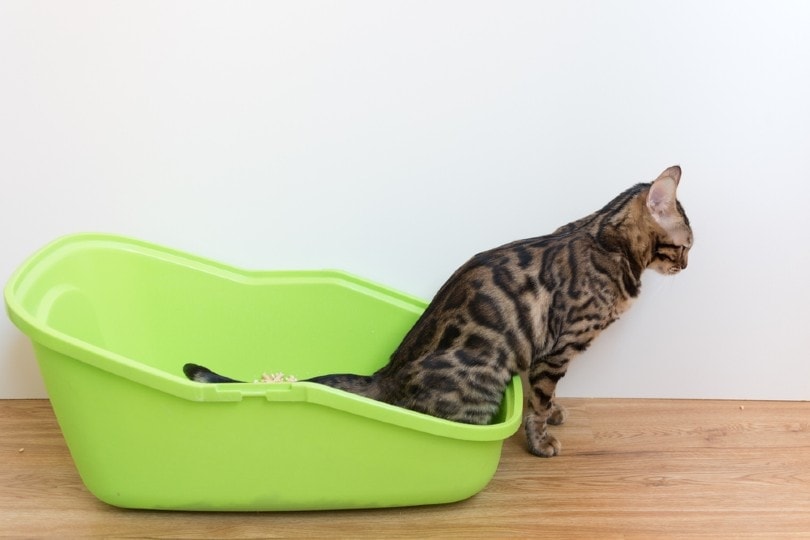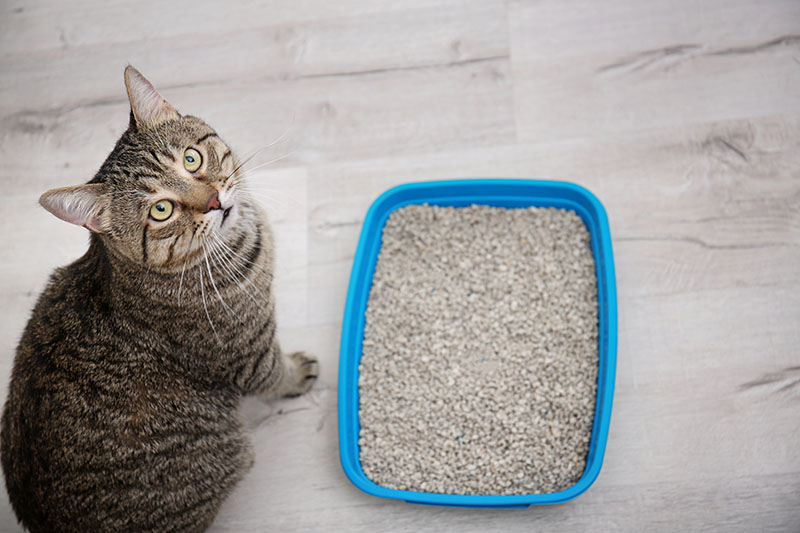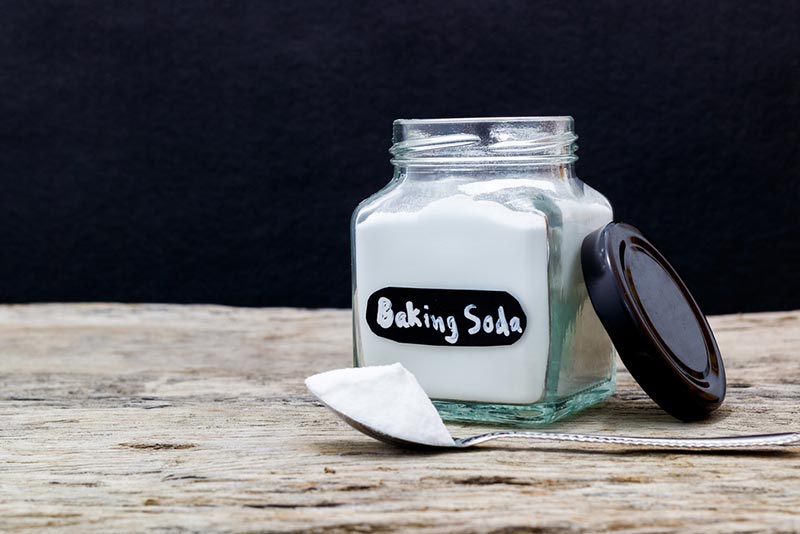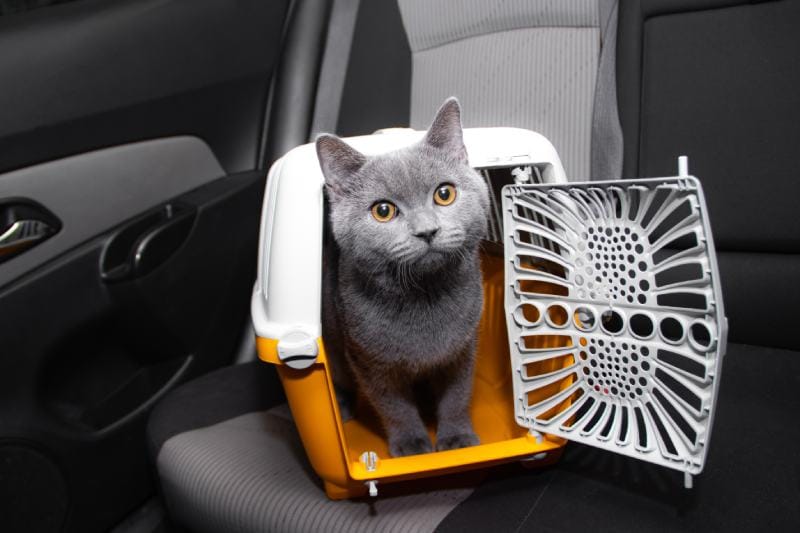Is Litter Deodorizer Safe For Cats? Safety & Effectiveness Examined

Updated on

Cats are very clean animals, spending much of their time everyday cleaning and grooming themselves. But like all animals, they need to pee and defecate multiple times per day, and cat urine and feces have a very strong odor which gets stronger as bacteria breaks it down. If your cat uses a litter box, then it is important that you have a way to deal with the smells.
Fortunately, there are many products on the market specifically created to tackle the problems of cat litter odors. Cats are in close physical contact with the products in their litter box, so it is natural for us to ask if litter deodorizer is safe for cats.
Litter deodorizer should be used cautiously and sparingly, as some formulations might contain fragrances or chemicals that could potentially irritate a cat’s sensitive respiratory system; it’s important to choose a cat-safe product and monitor your cat’s reactions.
What Is Deodorizer?
Cat litter deodorizer is a product that helps to control the odor of cat urine and feces. There are many different types of deodorizers on the market, but they all work in one of three ways to reduce odors by either masking the smell, absorbing moisture and the odors, or breaking down the chemicals that release the odors.
Deodorizers generally are either a spray you spray onto your litter box or are gel beads, powders, or granules you sprinkle onto your litter box. Deodorizers have to be regularly re-applied to the litter box, often daily. In addition to deodorizers, litter box liners, and air purifiers can also help control odors in your home.
Wondering whether an enzymatic spray or deodorizing powder is better at fighting pet odors? Compare our Pet Stain & Odor Eliminator Spray to our Deodorizer Powder to see which product is best for your deodorizing needs.
 Hepper Bio-Enzyme Pet Stain & Odor Eliminator Spray |
 Hepper Advanced Bio-enzyme Deodorizer & Litter Additive |
|
|---|---|---|
| Eliminates smells |
Eliminates smells:
|
Eliminates smells:
|
| Works inside your cat's litter |
Works inside your cat's litter:
|
Works inside your cat's litter:
|
| Removes stains |
Removes stains:
|
Removes stains:
|
| Works on contact |
Works on contact:
|
Works on contact:
|
| Works on a variety of surfaces |
Works on a variety of surfaces:
|
Works on a variety of surfaces:
|
| Unscented |
Unscented:
|
Unscented:
|
Are Litter Deodorizers Safe For Cats
Litter deodorizers are designed to be used in cat litter boxes, and since they’re designed for this purpose, they are all made to be non-toxic to cats. But toxicity might not be the only factor you need to consider.
A major issue around cat litter deodorizers, and cat litter in general, is how dusty it is. If your cat is sensitive to dust, the long-term exposure to dust in your cat litter could harm it. Any products that absorb moisture may increase the amount of dust in the litter box. When cats use the litter box, they disturb this dust and inhale it.
Whilst there is little scientific evidence about the widespread dangers of cats breathing in dust, there is a known case where chemicals from litter boxes were implicated in damage to a cat. Moreover, when your cat uses the litter box it will get dust on its paws which it will walk through your house and lick off and ingest when it cleans itself later.
Although, as humans, we may want to mask the odors from the litter box, scented deodorizers may irritate your cat’s nose and breathing, especially if scented oils are used in the product. How irritating this is for your cat is dose-dependent, meaning how strong the scent is and how long the cat is exposed to it.
Do Cats Like Litter Deodorizer?
Cats are fastidious creatures that love cleanliness, and they groom themselves several times a day. Cats also have very acute senses, including a keen sense of smell. Cats, like their owners, don’t like being around the smell of their urine and feces. So cats appreciate the effects of using deodorizer. However, cats are individuals and often are very fussy about their environments, so it should be no surprise that the type of cat litter deodorizer you choose can make a big difference to your cat.
Whilst individual preferences vary, most cats prefer a litter with little scent and a soft, sandy texture. Many of the more common litter deodorizers work by absorbing moisture which causes the cat litter to clump. Some cats don’t like this clumping effect, and it may cause them to seek alternatives to using their litter box.
If you are not sure which type of litter deodorizer your cat will like best, see what your local store stocks and try out some different brands or ask your veterinarian for recommendations.

Alternatives To Litter Deodorizer
Cat litter deodorizer is not the only way to get rid of the unpleasant odors created by your cat’s use of the litter box. Each alternative comes with its own pros and cons.
Combined Cat Litter and Deodorizer
Manufacturers of cat litter have long recognized the problems created by using their products and have sought to improve them. There are many brands on the market that include formulations to control cat litter odors. Like litter deodorizers, different brands take different approaches by using different chemicals. The advantage to a combined cat litter and deodorizer is that the manufacturer has considered the interaction of the different ingredients and optimized them to work together.
Bicarbonate of Soda (Baking Soda)
Bicarbonate of soda is often used as the main ingredient in both cat litter deodorizer and combined cat litter and deodorizer products. So if you run out of your normal deodorizing product, or if you are looking to save money, you could try sprinkling bicarbonate of soda directly onto your cat litter. However, be aware that the bicarbonate of soda is a fine powder and will increase the amount of dust in your litter box.

Odor Eliminators and Air Purifiers
You can buy devices that absorb odors from the air around them. Odor eliminators can be passive and are made from things like activated charcoal which you place in the room where the odors are. There are also active electronic odor eliminators that you plug into the mains, and they actively pull air in and blow it over some form of filter or chemical absorbent, which removes the odor chemicals from the air. Air purifiers are another option, but unlike electronic odor eliminators, they usually only use filters to clean the air; nevertheless, high-end air purifiers can still be very effective at removing odors.
Fresheners
Although scented litter deodorizer might be unsuitable for your cat, using a room air freshener could be a viable compromise. Whilst still being made from natural scents and oils, by not being placed in the litter box your cat receives a much smaller dose which may be more acceptable to your cat.
If all else fails, then you can try cleaning and changing your cat litter more often and using good ventilation to remove unwanted odors from your home.
Final Thoughts
Whilst litter deodorizer can be considered safe for cats the issues around whether a litter deodorizer is both suitable and acceptable for your cat reach beyond safety to include the texture and smell of the product in use. You’ll also want to consider whether dust is a problem and whether you want to minimize your cat’s exposure. If you decide not to use a litter deodorizer there are alternative ways for you to tackle the problem of litter box odor.
Featured Image Credit: Dina da, Shutterstock










